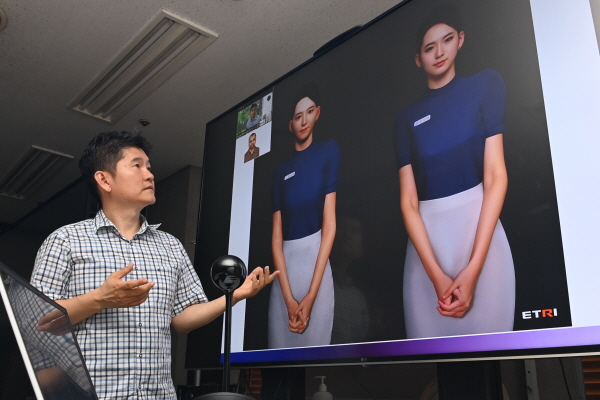한국전자통신연구원(ETRI)이 제안한 디지털휴먼 관련 품질평가 프레임워크가 국제표준으로 최종 승인되며, 향후 다양한 서비스에 대한 품질평가가 가능할 것으로 기대가 모아진다.

▲ETRI 이승욱 책임연구원이 렌더링 된 디지털휴먼 영상을 보며 설명하고 있다.
IEEE 사실표준화기구서 품질평가 프레임워크 국제표준 확보
국내 연구진이 제안한 ‘디지털휴먼’과 관련된 품질평가가 국제표준화기구에서 국제표준으로 최종 승인되며, 향후 다양한 서비스에 대한 품질평가가 가능할 것으로 기대가 모아진다.
한국전자통신연구원(ETRI)은 지난 6월 말 국제사실표준화기구가 주최한 회의에서 연구진이 제안한 디지털휴먼 관련 품질평가 프레임워크가 국제표준으로 최종 승인됐다고 24일 밝혔다.
디지털휴먼이란 사람의 신체 구조 및 움직임을 데이터화해 분석하고 가상공간에서 마치 실제로 존재하는 사람처럼 움직임을 재현하는 기술이다.
사람처럼 현실감 있는 표정 변화와 사람 감정으로 감성 대화가 가능하다.
ETRI는 디지털휴먼의 품질을 평가하기 위해 △질문리스트(Question List) △평가 방법(Evaluation Method) 등 표준 프레임워크를 제안했다.
연구진이 제안한 표준 프레임워크는 질문리스트를 바꾸면 디지털휴먼 뿐만 아니라 게임, 영상, 확장현실(XR) 등 다양한 서비스에도 적용할 수 있다.
이처럼 질문리스트 변경으로 다양한 서비스에의 적용이 가능한 이유에 대해 연구진은 질문리스트와 평가 방법을 분리해 응용 분야에 맞는 질의를 추가하는 방법을 적용했기 때문이라고 설명했다.
본 기술은 과학기술정보통신부(정보통신기획평가원)의 ‘실사 수준의 디지털 휴먼 생성과 30fps급 실감 렌더링 기술 개발’ 과제 결과물로 개발됐다.
ETRI는 본 과제를 통해 중저품질로 렌더링된 어색한 디지털휴먼 동영상을 인공지능 기술을 이용해 사람이 구별할 수 없는 수준으로 바꿀 수 있다고 밝혔다.
사실성 및 기능성을 갖는 고정밀 디지털 3D 휴먼 생성 기술인 셈이다.
이번 국제표준으로 제정된 기술을 이용하게 되면 국내·외 실사화된 디지털휴먼의 품질을 공식적으로 점수화해 평가할 수 있게 된다.
이로써 관련 산업 분야에서 몇 점의 디지털휴먼이 필요한지 요구사항에 대한 공식적 서비스 제공과 답변이 가능케 될 전망이다.
마치 디지털휴먼 수요에 맞춤형 공급이 가능케 된다는 의미다.
ETRI 이승욱 CG/Vision연구실 책임연구원은 “본 표준을 통해 최근 생성형 AI에서 만들어진 다양한 콘텐츠 품질을 평가할 수도 있다. 추후 산업체 주도 포럼 등을 통해 각 응용서비스에 맞는 디지털휴먼 품질 점수를 제공해 디지털휴먼 산업 전반의 콘텐츠 품질이 향상될 수 있을 것으로 기대한다”고 밝혔다.
ETRI 정일권 콘텐츠연구본부장도 “최근 ETRI는 사실표준화 활동 강화를 위해 큰 노력을 해왔다. 이번 성과는 그동안 연구진이 기술 개발 연계와 사실표준화 활동을 강화한 노력의 결과로 향후 품질평가 프레임워크를 다양한 분야에 적용할 수 있도록 노력하겠다”고 말했다.
이번 ETRI 연구진에 의해 제정된 국제표준은 휴먼팩터 기술그룹인 IEEE 3079 산하 디지털휴먼 그룹(IEEE 3079.3)에서 제정됐다.
본 표준은 ETRI 이승욱 책임연구원이 지난 2021년 7월에 최초로 IEEE 3079 회의에 표준 아이템으로 제안한 바 있다.
이후 2021년 12월에 IEEE-SA의 SASB에서 표준 프로젝트로 채택되었고 지난 6월, 최종 국제표준으로 승인됐다.